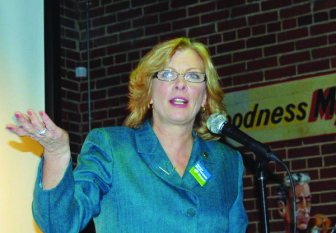
Chrystal Bartlett
Mayoral winner Nancy McFarlane gives a speech on Election night, Oct. 13, 2011.
The mayor’s chair is up for grabs, and Nancy McFarlane is looking to hold onto the seat.
First elected to the City Council in 2007, McFarlane took over the reigns of former mayor Charles Meeker in 2011 when he decided not to seek a sixth term.
McFarlane has two challengers for her seat: Robert Weltzin and Venita Peyton. Though the race is nonpartisan, both Weltzin and Peyton are registered Republicans.
McFarlane is unaffiliated.
Using the Wayback Machine, a web tool that enables users to look at websites in the past, we got a glimpse of the issues that were important to McFarlane when she was running in 2011.
Then we sat down with McFarlane to get her thoughts on how she addressed those issues in the past two years. Here’s a breakdown.
A Business-Friendly City
McFarlane said before the last election that in order to stay a business-friendly city, Raleigh needed a balance of low taxes, good amenities and a stable AAA bond rating.
During the past two years, the city has been able to maintain that rating.
“We do such a good job being fiscally responsible,” she said.
But, she added, city officials will have to wait and see how decisions on the state level will impact Raleigh’s future.
McFarlane said that the city has created a small business office, which aims at helping new small business start and existing small business grow.
Plenty of small businesses have begun operating in Raleigh, but two of the most notable business moves were tech giants Red Hat and Citrix to downtown Raleigh.
In January 2012, Red Hat announced that it would stay in Raleigh and relocate from Centennial Campus to downtown. In return the company got $1 million in incentives from the city.
Just six months later, Citrix Systems announced plans to stay and expand in Raleigh. Its new downtown headquarters is currently under construction.
More Transit Options
The Wake County Transit Plan currently lies in the hands of the Wake County Commissioners, who have the power to OK a referendum for a half-cent sales tax increase. Durham and Orange counties have already voted on and approved the increase, which would fund expanded bus service, commuter rail and possibly light rail.
“It is incredibly frustrating,” McFarlane said of the delay.
The city continues to plan for growth around the current, but unapproved, plan.
“It’s upsetting that it’s become sort of a political issue,” she said. “It’s not a political issue. It’s a fundamental economic development, quality of life issue.”
During the past two years, McFarlane said the Council has been focusing on improving the city’s bus system and maintaining the sidewalk infrastructure.
The city now pays for the maintenance of sidewalks, whereas in the past, it was the property owner’s responsibility.
Planning for Growth
After nearly three years of public comment, revision, review and debate, Councilors finally adopted the new Unified Development Ordinance, which is the zoning code that will work alongside the 2030 Comprehensive Plan.
McFarlane said that planning for growth goes back to transit and transportation since both are included in the comprehensive plan. While the trend shows that more people are heading to urban, walkable areas of the city, McFarlane said that there are still going to be people that want to live in the suburbs or in other parts of the Triangle and work in Raleigh.
Although it is still on hold, the acquisition of the Dorothea Dix property could potentially add a 325-acre park just a stone’s throw from downtown. McFarlane said she spent the first year of her term working on leasing the park from the state.
When the new administration came in, the Republican-led general assembly wanted to cancel the lease with the city, which was signed by former Gov. Bev Perdue. McFarlane and Gov. Pat McCrory came to a consensus that put the lease on hold until April 2014.
Water Quality
Water quality was a big issue during McFarlane’s 2011 campaign and remains so during this election season.
McFarlane said that she has been addressing stormwater issues since she got on the City Council in 2007. The following years, Raleigh residents lived through a drought, which slowed down the push for stormwater management. But older developments continue to cause problems downstream.
One of the toughest stormwater cases this year came through as a rezoning application. After months of discussion by the Planning Commission and by Councilors during committee meetings, City Councilors approved a rezoning that would allow a Lifetime Fitness athletic facility to be built in the Falls Lake watershed.
Partnering with N.C. State researchers, Lifetime Fitness proposed a number of stormwater management devices that would, in theory, make the water quality better than what is currently on the property.
But, the rezoning set a precedent for large-scale development in the watershed.
“That was really, really tough,” McFarlane said of the case.
McFarlane voted in favor of the rezoning in June, but said she still has concerns about the project.
Tiered water rates were implemented in the summer of 2011, before the election, but they continue to play a role in how the city pays for new water infrastructure. McFarlane said that the tiered rates give users more control over their water bill, but they need to understand that a large portion of their bill goes to running the water treatment plants and replacing the pipes that brings water to their taps.
Drew St. Claire assisted with this reporting